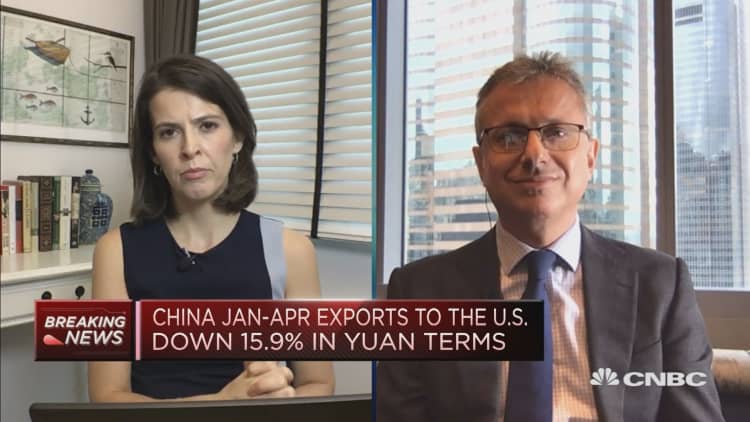The coronavirus pandemic will fuel the already-bad rivalry between the U.S. and China, and could even tilt the balance of global power in Beijing's favor, analysts say.
Tensions have already flared on a few fronts since the pandemic started. Washington and Beijing are sniping at one another about the true extent and origin of the coronavirus outbreak. U.S. President Donald Trump threatened tariffs again. The two countries have even squabbled about the South China Sea issue.
The pandemic will "increase US-China strategic rivalry," says global political risk consultancy Verisk Maplecroft.
"The coronavirus pandemic is undoubtedly fuelling an increase in geopolitical tensions between the US and China," Hugo Brennan, principal Asia analyst at Verisk Maplecroft wrote in a Wednesday note, predicting that the virus will remain a key source of friction for the next 12 months.
"In times of crisis, global rivalries tend to intensify rather than abate. The coronavirus crisis has led to a further deterioration in the already chronically bad relations between China and the US," The Economist Intelligence Unit (EIU) added in a note on Wednesday. "The coronavirus epidemic is not the cause of the difficulties in US-China relations, however; it is merely exacerbating trends that have existed for years as both countries compete for economic dominance."
The pandemic is therefore likely to accelerate the rebalancing of global economic power from the West to the East in coming years.The Economist Intelligence Unit
Both economic giants have been embroiled in a trade war for the past couple of years which has spilled over into disputes on intellectual property rights, and evolved into larger issues such as technology dominance. In January, both countries reached a phase one deal before the virus hit. But the future of that deal is now in question — last week, Trump said it was now "secondary" to the pandemic and threatened new tariffs on Beijing in retaliation for its virus response.
Trump is likely to build his presidential campaign around a "Blame China" rallying call, Brennan said, and if he gets re-elected, it would lead to another four years of "fractious relations" with Beijing.
Beijing will use crisis as opportunity to extend global influence
Crucially though, despite the anti-China rhetoric, analysts say that the pandemic would likely speed up the shift in global power from the West to the East.
China has been blamed by not just the U.S., but also the U.K. and Australia for its initial response to the outbreak, which was criticized as slow and non-transparent.
But that won't stop the Asian giant from extending itself globally. China could even use the crisis as an opportunity to raise its profile and expand its influence, particularly over countries hard-hit by the pandemic by providing much needed support, analysts say. Beijing has already embarked on so-called mask diplomacy, sending medical supplies to affected countries.

In particular, China could further cement its presence in parts of Africa, eastern Europe, Southeast Asia, and Latin America, said the EIU.
Kaho Yu, senior Asia analyst at Verisk Maplecroft, pointed to three factors: Beijing's "aggressive global propaganda campaign promoting China's role in suppressing the virus," a looming global recession that will sap the appetite of many leaders to blame their biggest trade partner for how it handled the outbreak; and the pandemic "underscoring the absence of American leadership on the global stage."
Cases in the U.S. have shot up, making it the worst-hit country, while Chinese government data showed the outbreak has subsided to a few cases a day in the mainland.
Those three factors, the firm said, may result in "China's power and influence increasing," although it stressed it is still too early to tell.
Furthermore, the economic fallout from the global pandemic will have a "long-lasting" impact on the developed U.S. and European economies, the EIU said. That's because the fiscal and monetary measures that those countries have to take to deal with the crisis will result in greater dependence on easy money and debt, causing years of slower growth.
On the other hand, China, simply by virtue of being the first to emerge from the crisis, will also be first to recover economically, said the EIU.
"The pandemic is therefore likely to accelerate the rebalancing of global economic power from the West to the East in coming years," the EIU said. "Unless the developed nations change course and pursue a radically different economic path after the crisis, the gap between a slow-growing West and an economically dynamic East is likely to widen."


